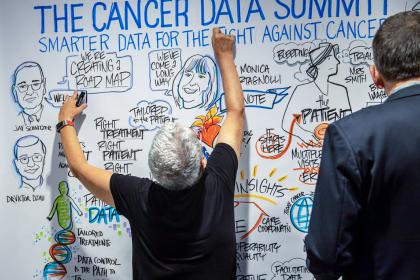
Oncology Moonshot
Sharing Patient Data Across Health Systems Can Save Time and Even Lives.
In a big healthcare network that includes hospitals, doctors, and labs, your electronic health record (EHR) can be quickly shared among all the people who are providing your care. But if you go to another healthcare network for treatment—whether across town or in another state—EHR records are much harder to share.

In fact, you may have to email or hand deliver your files or X-rays to a new provider because the two networks can’t access or read each other’s data. This loss of time can be frustrating—especially if you’re facing a cancer diagnosis.
In creating our Oncology Moonshot, a team of doctors and health IT experts imagined an environment in which physicians, health systems, pharmacists, and researchers would all “speak the same language” via a data standard. Standards allow data to be shared more easily and improve data quality for better and more insightful decision making. That is, networks can quickly and efficiently share secure patient information needed to better coordinate patient care and accelerate both treatment and research.
Our goal: every interaction between a clinician and patient provides data that could be used to improve treatment for all future patients.
Getting it Right
We started with cancer care to prove that stakeholders could develop a broadly accepted EHR standard for oncology that would lead to improved treatment and research, including clinical trials. Our solution is nonproprietary, open source, and based on Fast Healthcare Interoperability Resources (FHIR).
Thanks to the hard work of hundreds of organizations, the cancer community is now using this data standard, minimal Common Oncology Data Elements, or mCODE, to collect, share, and extract data from EHRs. A diverse research team is testing mCODE in numerous situations, not just in routine care, but to match more patients with clinical trials, quickly input patient data into cancer registries used by researchers, and obtain faster prior authorization for treatment.
(dramatic music)
I'm Su Chen.
I'm a clinical science principal here at MITRE in digital health on the Bedford, Massachusetts campus.
The work of mCODE and CodeX was sponsored by MITRE's research program.
MITRE and its partners developed mCODE, a common data language for a cancer.
So as a patient, it's really difficult, right?
You go to your doctor and you feel like you have to re-explain what your prior doctor or another specialist has already done for you.
But when it comes to cancer, mCODE allows us to speak via a common language, so that no matter what you're doing in health, be it research, patient care, trying to get something paid for or approved, you can use mCODE to speak easily throughout, so that you can focus on health and not the process of trying to get your health taken care of.
CodeX is a not-for-profit, member-driven community.
We are singularly focused on advancing data centers like mCODE, so that as patients, we can have the care and research journeys that we deserve and truly should expect.
When it comes to the healthcare community, there's so many times when you're faced with this tangled web of next steps or transactions that you have to figure out just to do something simple that you feel like your patient needs.
Let's take the focus from their healthcare community back to focusing on our patients and not on process.
mCODE and CodeX, we've been able to start to see success in ways that have been difficult and not seen before when tackling this long-standing problem in healthcare data sharing.
And we've been able to do this by leveraging MITRE's long-standing experience and expertise as a trusted advisor, as an expert convener of community stakeholders.
Looking ahead, we're going to double down on that success that we've had in cancer, and now make great strides in our new growth areas, in genomics and cardiovascular health, and how we apply this to patients with Alzheimer's and dementia.
The aspects of my work here at MITRE that I find rewarding is this ultimate aim in everything I do in promoting the public good, especially for patients and for their healthcare providers.
MITRE's workplace culture fosters a special kind of energy.
Every team I've been on, every single person, had the ultimate aim and driving commitment to do the public good.
(dramatic music fades)
MITRE Connects
At the heart of our progress is the community of stakeholders MITRE built to expand the use and impact of mCODE. We established CodeX™, a Health Level Seven (HL7) FHIR Accelerator, as a sustainable community to drive the use of real-world tested data standards.
This community supports the adoption of mCODE and drives sustained and scalable impact by engaging MITRE government sponsors and the broader healthcare community.
What’s next? MITRE and CodeX are collaborating with organizations interested in scaling our community approach beyond oncology into the areas of cardiovascular health and genomics.
About MITRE Moonshots
MITRE Moonshots are high-risk, potentially disruptive research endeavors that require significant investment but can produce significant returns to the nation. Moonshots seek to fundamentally alter the nation’s technical capabilities and approaches to complex problems. We combine diverse expertise, perspectives, and resources by connecting partners in government, industry, academia, and other mission-driven organizations.


